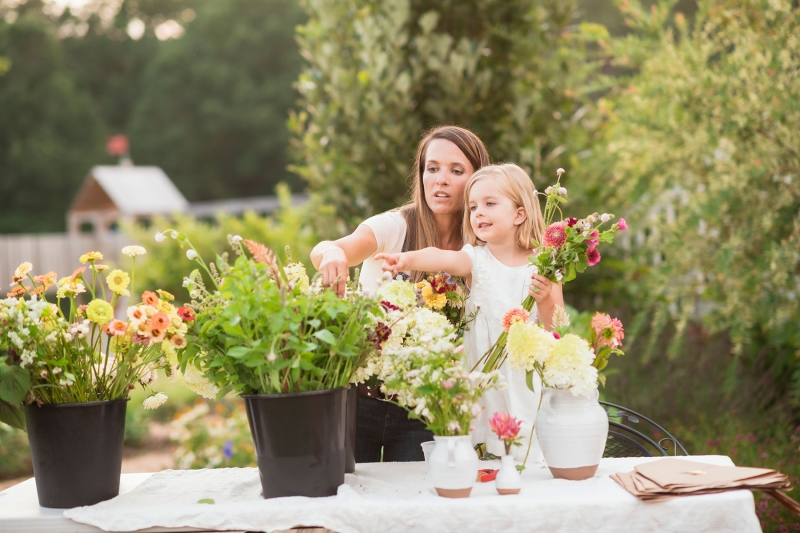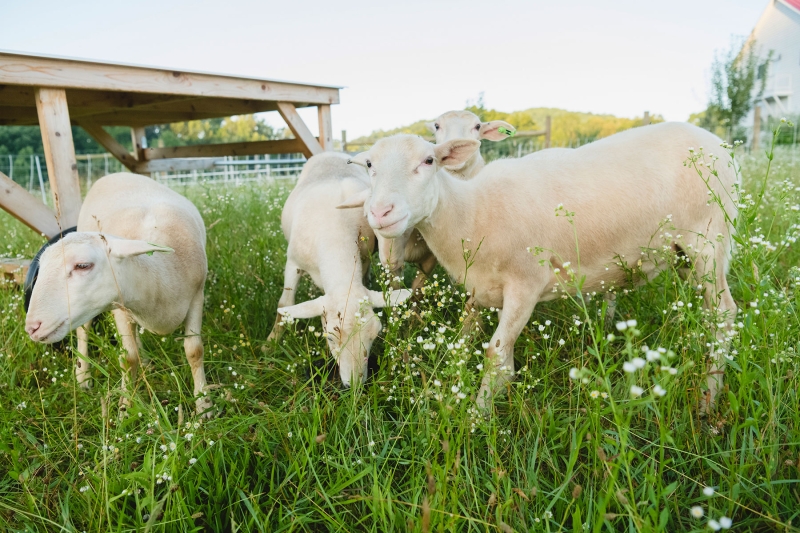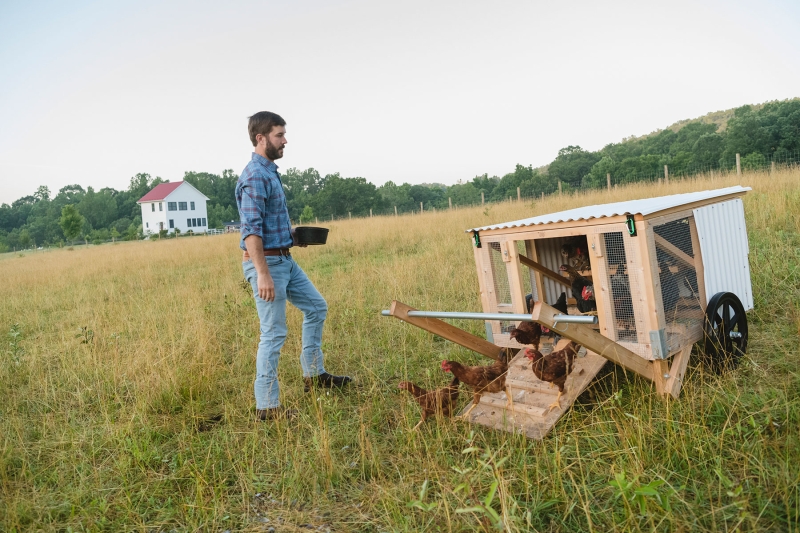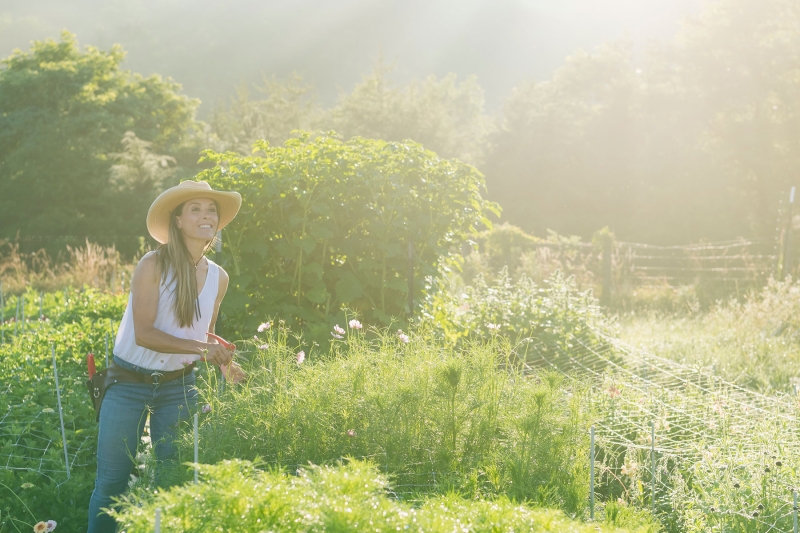Growing a Greener Future For W&L alumni Kevin Green ’07 and Amanda Green ’06, nature and nurture go hand-in-hand.
“The advice that Kevin and I both give to undergraduates and young alumni is that it’s very unlikely that your career is going to be as linear, or even as intentional, as you might expect at the start, and it definitely helps to be open to that as early as possible.”
~ Amanda Green ’06
Spring is a time of renewal, when most of us can’t wait to get outside and enjoy nature emerging from winter. For alumni Kevin Green ’07 and Amanda Green ’06, it’s also an exciting time – signaling a fresh start as their business ramps up again for the new year.
The couple returned to Rockbridge County from Seattle, Washington in 2015 and founded Yonderyear Farm, a 30-acre farm in Rockbridge Baths specializing in certified naturally grown cut flowers and grass-fed lamb. The Greens’ journey into entrepreneurship and establishing the farm began with the broad liberal arts education they received at Washington and Lee University and was further inspired by their varied professional experiences. Amanda double majored in business administration and environmental studies and volunteered for the Peace Corps after graduation before moving to the United Kingdom to study rural agricultural development.
“Food, agriculture and sustainability were always central to my interests, but it wasn’t really until after those initial professional experiences that I decided to focus on pursuing them in a physical, creative sense rather than in the abstract,” Amanda said. That decision led her to work in kitchens with chefs such as James Beard Award–winning chef Renee Erickson and others in Seattle and Washington, D.C. as the couple’s professional lives moved them around the country.
“I got to learn so much more about what it takes to prepare a meal that is both delicious and good for the land. A great chef is only as good as the quality of their ingredients. Producing the highest quality food in a way that improves the land is as important as anything that happens in the kitchen.” Green said this is what eventually led the couple to want to incorporate certified naturally grown, 100% grass-fed lamb into their business model.
Kevin majored in philosophy, sociology and anthropology, and East Asian Languages and Literature at W&L. Since graduation, he has worked for an international environmental non-governmental organization for the past 12 years in addition to managing Yonderyear Farm’s growth.
“We both grew up here in Virginia, and after graduating from W&L, our interests took us all over the world,” Amanda said. “We lived on four different continents before realizing it was right back here in Rockbridge County where we wanted to build a life, raise a family and support the community. Though not always in a straight line, the farm has grown out of our interests – working together, being creative, using our bodies and learning new things. The rest is just about figuring it out as we go.”
While sustainable food is a passion for the Greens, the property also provided a unique opportunity to enter the cut flower market, as flowers allow for a higher density of product on a smaller amount of acreage than grazing animals.
“So much of what we love to do is to take the things that we produce and be creative with them, and flowers allow for that,” said Amanda, “as well as supporting our rotational grazing system with the animals.”
The Greens were also interested in breaking into an emerging market for environmentally friendly floral arrangements. Conventional flower farming relies heavily on synthetic fertilizers, pesticides and herbicides, which can contaminate water and soil and ultimately harm biodiversity. The demand for cut flowers has also led to unsustainable practices such as air-freighting flowers long distances, which contributes to greenhouse gas emissions. Sustainable cut flower farming seeks to reduce negative environmental impacts by reducing energy consumption and waste, relying on organic and regenerative farming practices and focusing on seasonal flowers that are native to the local area. The bourgeoning wedding and events industry in the region have been helpful to Yonderyear Farm’s growth, along with its annual bouquet subscriptions.
The farm also specializes in what the Greens call “100% grass-fed, grass-finished” lamb, a program they plan to expand in the coming years.
“In our region, lamb has been relegated to a few holidays and special occasions, but that seems to be changing quickly as folks are getting more interested in experimenting with different local and sustainable meat options,” Kevin said. “I think the pandemic may also have led to people branching out more to break up the monotony. We’ve been very encouraged by the interest in what we’re doing here with high-quality grass-fed lamb.”
The flock is rotated regularly through Yonderyear’s pastures and orchards, providing fresh grass for the animals to eat and improving soil health by mimicking natural processes.
“Not only are they producing superior meat,” Amanda said, “they are restoring and building soil on parts of the farm that will eventually produce more flowers and fruits for our customers.”
The Greens take a thoughtful approach with every aspect of the farm, right down to their chickens, a crew of Silver Laced Wyandottes the Greens chose because their foraging both aids in pest control and provides the family with fresh eggs.
“Everything is geared toward the purpose of supporting the whole system,” Kevin said. “So, we rotate the chickens around behind some of the livestock because they consume things like fly larvae in the manure that break up pest cycles, which then turn into eggs for us. Everything has a job on the farm, even the cats.”
The Greens credit their time at W&L with providing a foundation for their multi-layered career paths by sparking their curiosity and confidence to try new things.
“It’s a bit of a circuitous journey, but really all of our experiences feel very formative in leading us to where we are now,” Amanda said. “The advice that Kevin and I both give to undergraduates and young alumni is that it’s very unlikely that your career is going to be as linear, or even as intentional, as you might expect at the start, and it definitely helps to be open to that as early as possible. I didn’t know 15 or 16 years ago that we’d end up farming like this, but it makes perfect sense in hindsight. It combines all the things we love and care about and constantly keeps us learning, challenging ourselves and growing together.”
If you know any W&L alumni who would be great profile subjects, tell us about them! Nominate them for a web profile.
 Amanda Green ’06 and her daughter arrange bouquets at Yonderyear Farm.
Amanda Green ’06 and her daughter arrange bouquets at Yonderyear Farm. Yonderyear lambs enjoy a 100% grass-fed diet.
Yonderyear lambs enjoy a 100% grass-fed diet. Kevin Green ’07 tends to the farm’s chickens.
Kevin Green ’07 tends to the farm’s chickens. Spring flower harvest at Yonderyear Farm
Spring flower harvest at Yonderyear Farm
You must be logged in to post a comment.